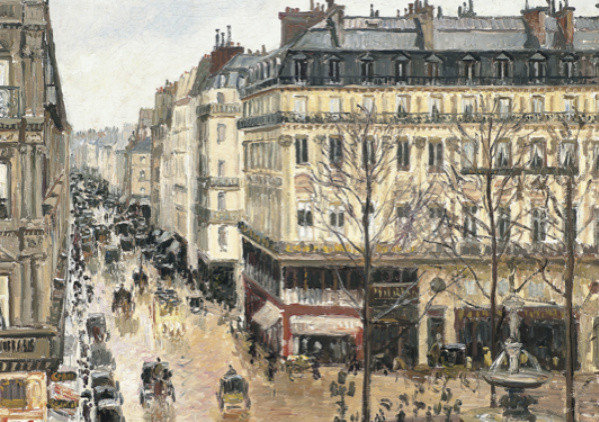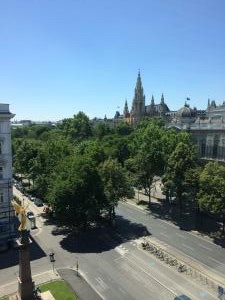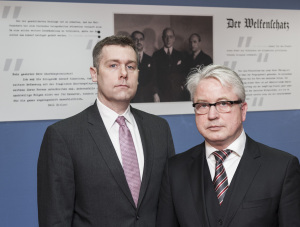We were privileged to file today a petition for certiorari with the Supreme Court of the United States on behalf of our client, art dealer Alexander Khochinsky. The petition asks the Court for reinstatement of a lawsuit against Poland for lack of subject matter jurisdiction (i.e., sovereign immunity) for Poland’s effort to have Khochinsky extradited from New York as leverage to force him to relinquish a painting that he inherited from his father. The case invokes three provisions of the Foreign Sovereign Immunities Act, 28 U.S.C. § 1605 (the FSIA): the implicit waiver exception, the counterclaim exception, and the non-commercial tort exception. The basis on which we seek the Court’s review is simple: if the holding below is the law, then no one is safe in the United States from any number of rogue regimes that abuse the extradition system for discriminatory and persecutory reasons. To allow this decision to stand is a threat to any American. What if, for example, Turkey pursued a Christian American in similar fashion motivated by religious animus about owning a particular kind of art from the Ottoman Empire? What if the Taliban, now the de facto government of Afghanistan, declared a worldwide intention to find Jews in possession of Pashto cultural property? What if China declared American intellectual property to be revolutionary patrimony?
Art Dealer and Holocaust Claimant Asks Supreme Court to Hear Dispute Over Poland’s Vendetta Against Him
Topics: China, Alexander Khochinsky, Holocaust claims, extradition, FSIA, "Girl with Dove", Foreign Sovereign Immunities, Poland, Sullivan and Worcester LLP, 28 U.S.C. § 1605, Operation Barbarossa, Taliban, Afghanistan, Turkey, Pashto
$43.7 Million Interim Judgment Entered Against Russia for Refusal to Restitute Chabad Library
It has been quite some time since there was occasion to update the dispute between the Chabad Lubavitch movement and Russia over Chabad’s efforts to obtain the return of the library of the movement’s late rabbi Menachem Schneerson and his predecessors (each known in his respective era as the “Rebbe”). There is now a major development. The court has granted the Chabad plaintiffs’ request to turn the daily sanctions that began to accrue in 2013 into an interim judgment, that is, to tally the $50,000 daily fines to date. The U.S. District Court in Washington, DC has done so, and entered a judgment against the Russian Federation, the Russian State Military Archive, the Russian State Library, and the Russian Ministry of Culture and Mass Communication, for a total of $43.7 million. Notably, the judgment will increase automatically by $4.5 million every 90 days if not satisfied; the plaintiffs will not have to return to the court and ask for an amended judgment. Plaintiffs have already begun efforts to identify assets from which that judgment could be collected.
Topics: Latvia, Sberbank, Nazi Germany, Russian State Military Archive, Menachem Schneerson, Russian Ministry of Culture and Mass Communication, Foreign Sovereign Immunities Act, Rebbe, 28 U.S.C. § 1603, Russian Federation, FSIA, Restitution, Russian State Library, World War II, Foreign Sovereign Immunities, Poland, Chabad Lubavitch, Soviet Union, Museums
Seventh Annual National Cultural Heritage Law Moot Court Competition in Chicago
DePaul University College of Law and the Lawyers' Committee for Cultural Heritage Preservation have announced registration for the seventh annual National Cultural Heritage Law Moot Court Competition. The competition will be held February 26-27 at the Everett M. Dirksen United States Courthouse, in Chicago, Illinois. From the announcement:
Topics: National Cultural Heritage Law Moot Court Competit, Everett M. Dirksen United States Courthouse, Foreign Sovereign Immunities Act, Chicago, Greece, Parthenon Marbles, DePaul University College of Law, British Museum, Events, Foreign Sovereign Immunities, Illinois, Lawyers' Committee for Cultural Heritage Preservat
Foreign Cultural Exchange Jurisdictional Clarification Act and the Immunity from Seizure Act—Status Quo Is Often Misunderstood
There has been additional commentary in the last week on the Foreign Cultural Exchange Jurisdictional Clarification Act, including this piece at Hyperallergic in which I’m quoted. The piece reminds me to revisit a confusing subject latent in the whole discussion: immunity from suit versus immunity from seizure. Despite what one frequently reads, the current bill would have no effect at all on immunity from seizure, which seems to be most people’s concern. It would affect only a small category of exceptions for immunity from suit, that is, who can be sued, not what can be loaned into the United States.
Topics: Foreign Cultural Exchange Jurisdictional Clarifica, Amsterdam, Thyssen-Bornemisza Collection, U.S. Federal Republic of Germany, Foreign Sovereign Immunities Act, FSIA, Restitution, Kingdom of Spain, IFSA, Foreign Sovereign Immunities, Immunity from Seizure Act, Museums, 28 U.S.C. § 1605, Foreign Cultural Exchange Jurisdictional Immunity, State Department
Cassirer and the State of Restitution—Takeaways and Next Steps
I’ve been talking quite a bit to friends, colleagues and clients about the impact of last week’s decision in the Cassirer v. Thyssen Bornemisza case. The New York Times had a follow up article yesterday which was an interesting treatment of the various themes at work in the case and in restitution cases in the United States generally these days. In fact, I think the effect is mostly limited, except to the extent that the decision assumes and treats as uncontroversial important principles about sales under duress and is a case that resolved title under the Foreign Sovereign Immunities Act (FSIA). As we predicted, the Times article makes clear that the museum has absolutely no intention of giving the painting back, but did float the idea of some recognition of the historical circumstances, which is progress (certainly compared to other instances in which obvious circumstances of duress are denied).
Topics: Lilly Cassirer Neubauer, Terezin Declaration, Thyssen-Bornemisza Collection, Rue St. Honoré après-midi êffet de pluie, Jacques Goudstikker, California Code of Civil Procedure § 354.3, Nazi-looted art, Foreign Sovereign Immunities Act, Washington Conference Principles, Bakalar v. Vavra, Fritz Grünbaum, FSIA, adverse possession, expropriation exception”, Restitution, Marei Von Saher, sovereign immunity, Egon Schiele, Jakob Schweidwimmer, World War II, Foreign Sovereign Immunities, Restatement (Second) of Conflict of Laws § 222, Altmann v. Republic of Austria, Camille Pissarro, foreign affairs doctrine, Ninth Circuit Court of Appeals, Museums, Baron Hans-Heinrich Thyssen- Bornemisza, 28 U.S.C. § 1605
Foreign Cultural Exchange Jurisdictional Clarification Act Returns
The U.S. House of Representatives passed yesterday H.R. 889, the Foreign Cultural Exchange Jurisdictional Clarification Act for the third time in four years. Identical bills passed the house in early 2012 and again last year but failed to win passage in the Senate and signature by the President, thus expiring without becoming a law (and remaining just a bill sitting on Capitol Hill). Will it become law? Probably not, and after a little reflection and evolution, that’s probably for the best.
Topics: U.S. House of Representatives, Foreign Cultural Exchange Jurisdictional Clarifica, Second Hickenlooper Amendment, Russia, Herrick Feinstein, Nazi-looted art, Konowaloff, Stiftung Preussischer Kulturbesitz, Association of Art Museum Directors, Restitution, World War II, Foreign Sovereign Immunities, act of state doctrine, Senate, Altmann v. Republic of Austria, Capitol Hill, Immunity from Seizure Act, Chabad, Federal Republic of Germany, 28 U.S.C. § 1605, Welfenschatz, Foreign Cultural Exchange Jurisdictional Immunity, Mari-Claudia Jiménez, Cuba
District Court Dismisses Cassirer Claim for Pissarro against Thyssen Bornemisza Collection by Applying Spanish Law of Adverse Possession
One of the longest running art restitution litigations in the United States has been dismissed for a second time, with another appeal likely to follow. The heirs of Lilly Cassirer Neubauer have been pursuing the return of Camille Pissarro’s Rue St. Honoré, après-midi, êffet de pluie from the Thyssen-Bornemisza Collection in Madrid for more than ten years, but on June 4, 2015 the U.S. District Court in Los Angeles ruled that the Spanish museum has acquired full title to the painting by adverse possession. The key aspect of the decision is the court’s resolution of the choice of law question, namely, should California law or Spanish law apply to the question of who owns the painting? After a lengthy analysis the court determined that Spanish law applies, and that the museum has possessed the painting long enough to have become the owner regardless of the fact that it was sold under duress. So now a case that has already been to the Ninth Circuit Court of Appeals twice will almost certainly head back a third time. The court concluded its decision by appealing to the parties to “pause, reflect, and consider whether it would be appropriate to work towards a mutually-agreeable resolution of this action, in light of Spain’s acceptance of the Washington Conference Principles and the Terezin Declaration, and, specifically, its commitment to achieve “just and fair solutions” for victims of Nazi persecution.” But it is hard to see why that would happen. Notwithstanding the dictates of the Washington Principles, the Collection has been quite content to resist the claim. Now that it has won, it is hard to imagine it suddenly taking a different view.
Topics: Lilly Cassirer Neubauer, Terezin Declaration, Thyssen-Bornemisza Collection, Rue St. Honoré après-midi êffet de pluie, Jacques Goudstikker, California Code of Civil Procedure § 354.3, Nazi-looted art, Foreign Sovereign Immunities Act, Washington Conference Principles, FSIA, adverse possession, expropriation exception”, Restitution, Marei Von Saher, sovereign immunity, Jakob Schweidwimmer, World War II, Foreign Sovereign Immunities, Restatement (Second) of Conflict of Laws § 222, Altmann v. Republic of Austria, Camille Pissarro, foreign affairs doctrine, Ninth Circuit Court of Appeals, Museums, Baron Hans-Heinrich Thyssen- Bornemisza, 28 U.S.C. § 1605, Welfenschatz
The Woman in Gold: Why the Altmann Case Matters
The release last week of The Woman in Gold, the feature film adaptation of The Lady in Gold by Anne Marie O’Connor, starring Helen Mirren and Ryan Reynolds as Maria Altmann and her attorney E. Randol Schoenberg, respectively, as well as Tatiana Maslany as the younger Altmann and Daniel Brühl as Austrian journalist Hubertus Czernin, is an important opportunity to reflect on the legal importance of the case. Even today, the case provides lessons about the way some victims are still treated, and how one individual can make sure the past is never forgotten. The looting of Jewish art collections was a concerted effort whose prominence should never be forgotten. And perhaps even more, it robs those who did survive of the dignity of remembering their family experiences. Consider: the next time you gather with your extended family, look around the room. Pick something that you’re accustomed to seeing when the family meets. Now, imagine it had been stolen or surrendered under duress, and was hanging on the wall of a national collection that denied it had been taken. How would you feel? This is the dilemma faced by many claimants, and it is precisely why Altmann matters so much.
Topics: Maria Altmann, The Lady in Gold, Adele Bloch-Bauer, The Woman in Gold, Daniel Brühl, Germany, Nazi-looted art, Academy of Fine Arts, Foreign Sovereign Immunities Act, Hitler, Tatiana Maslany, Anne Marie O’Connor, Supreme Court, A Few Good Men, Belvedere, E. Randol Schoenberg, World Jewish Congress, Stiftung Preussischer Kulturbesitz, Ryan Reynolds, FSIA, expropriation exception”, Restitution, Neue Galerie, World War II, Foreign Sovereign Immunities, Switzerland, Ferdinand Bloch-Bauer, Helen Mirren, Museums, Fritz Altmann, Gustav Klimt, Vienna, Welfenschatz, Hubertus Czernin, Ronald Lauder, Austrian National Gallery
Austrian Committee Recommends Against Restitution of Klimt Beethoven Frieze
As expected, the Austria’s Advisory Committee (Der Beirat gemäß § 3 des Bundesgesetzes über die Rückgabe von Kunstgegenständen aus den Österreichischen Bundesmuseen und Sammlungen, BGBl. I Nr. 181/1998 i.d.F. BGBl. I Nr. 117/2009, (Kunstrückgabegesetz)) issued a decision on Friday with respect to the Lederer family’s claim to the famous Beethoven Frieze. In a lengthy opinion, the Committee recommended against restitution, prompting widespread speculation about what the claimants would do next. The mural is installed at Vienna's iconic Secession Museum (my photograph of the museum exterior, taken today, is below), and is one of the icons of fin-de-siècle Vienna.
Topics: Kunstrückgabebeirat, Galerie St. Etienne, Strasbourg, European Court of Human Rights, Marc Weber, Beethoven Frieze, Beethovenfries, Restitution, Jane Kallir, World War II, Foreign Sovereign Immunities, Der Beirat gemäß § 3 des Bundesgesetzes über die R, Lanter Rechtsanwälte, Secession Museum, Gustav Klimt, (Kunstrückgabegesetz), Vienna
Guelph Treasure Claims—Coverage and Analysis
It has been almost two weeks since I filed my clients’ claims for restitution of the Guelph Treasure (Welfenschatz).
Topics: Maria Altmann, Frankfurter Allgemeine Zeitung, National Socialists, Third Reich, artdaily.org, Reuters, United States Supreme Court, Gestapo, Haaretz, Deutschlandradio. Deutsche Presse Agentur, Robin Young, the Guardian, The Art Newspaper, Foreign Sovereign Immunities Act, The Wall Street Journal, Deutsche Welle, Santa Fe, KRQE News 13, the Observer, Markus Stoetzel, Die Erle, Mel Urbach, Nazis, Advisory Commission, 3SAT, ZDF, Stiftung Preussischer Kulturbesitz, Washington DC, Hermann Goering, Private Wealth, Restitution, Sullivan & Worcester LLP, Here & Now, Gerald Stiebel, World War II, Foreign Sovereign Immunities, flight tax, Süddeutsche Zeitung, Adolf Hitler, United States District Court, The New York Times, Federal Republic of Germany, BBC News Europe, Alan Phillip, Welfenschatz, NPR, PrivateArtInvestor, ArtNet news







